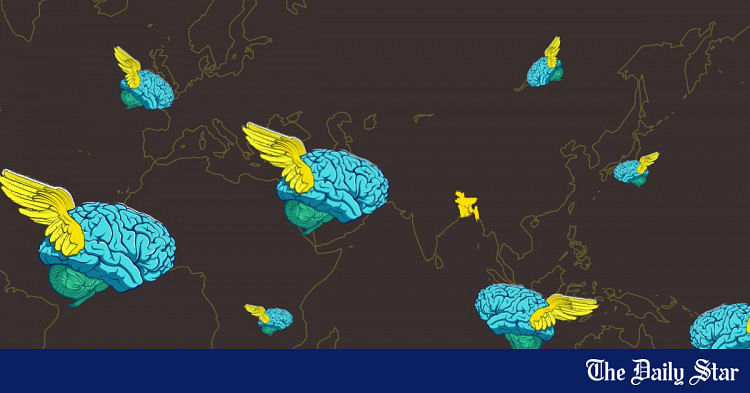An alarming brain drain crisis
Why are Bangladesh's brightest engineering minds leaving?

Illustration: Mubtasim Alvee
Every once in a while, the term "brain drain" pops up in discussions to dissect the migration of so many Bangladeshi students to foreign countries. Although the migration takes place in pursuit of higher studies, most of these students have no intention to return to the country. The percentage is even higher for engineering students.
While the outrage and panic regarding the lack of qualified engineering and research graduates in the country might be valid, we must ask the right questions and find out the factors which influence so many engineering students leaving their motherland.
The primary motive for engineering students to move abroad is the lack of scope and the poor salary structure in engineering jobs in the country, according to Iftekhar Amin Ifty, an M.Sc. (Engineering) student at Minnesota State University, "I graduated in Materials Science and Engineering from Rajshahi University of Engineering & Technology (RUET). Since there aren't too many job options for a Materials Science graduate in the country, my father advised me to move abroad. But I wanted to stay in Bangladesh since my family, relatives and friends are all here. I started working in a government institute as well. However, a closer look into the Bangladeshi engineering job sector made me change my mind."
"Starting from the highly competitive admission procedure for the public engineering universities to four years of inhumane pressure, graduating with a good CGPA takes an insane amount of hard work," explained Ifty. "After graduation, you get offered a mere salary of Tk 26,000 – 30,000 while your business graduate friends, who experience a somewhat easier undergraduate life compared to engineering students, might be earning a higher entry salary. Discrepancies like these make all your hard work feel worthless."
For some, it is the pursuit of better learning resources and research facilities in a more developed education system that influences their decision to leave the country.

Photo: Orchid Chakma
"I have always felt that the education system in this country is broken," said Anindya Alam, a fourth-year undergraduate student at Bangladesh University of Engineering and Technology (BUET). "The classes are boring and the teachers are mostly insincere and uninterested in teaching. I am close to finishing my undergrad now and I still feel the same. I have always liked learning new things and have grown up hearing praises about the teaching process in American universities from my relatives and friends who were in the States. Now that I am about to graduate and pursue a PhD degree, colleges in North America and Europe can provide me with the opportunities, facilities, and resources that Bangladeshi universities simply cannot."
Another massive factor for moving abroad is merely shifting to a better life in a country with more developed working and living conditions.
"If I must put my motives to settle abroad in one word, it would be to search for a better life," said Shartaz Ahmedur Rahman, an M.Sc. (Engineering) student at Auckland University of Technology. "After the first three months of studying Architecture at the Military Institute of Science and Technology (MIST), I wanted to move abroad. It wasn't driven by academic reasons at that point, but rather by watching the lives of some of my friends who had left the country for their undergraduate studies. After talking to them, the difference in the living conditions and facilities between Bangladesh and countries abroad hit me in the face. By my third year of undergraduate studies, when I was finally able to comprehend my field of expertise, I realised moving abroad was the only option for me."
As I spoke to more and more engineering students, it all circled back to the pitiful working conditions and salary structure for engineers in Bangladesh. In the end, our engineering students are left with one of three feasible options: switching their fields by doing an MBA, sitting for the Bangladesh Civil Service (BCS) exams, or leaving the country in pursuit of higher studies.
"Anyone who worked in the technical fields in Bangladesh can vouch that it is a massively competitive and stressful field. Either you break yourself mentally and physically to reach the top in the private sector, or you grind yourself to land a government job," said Shartaz. "In the private sector, unless you have backing from your family, it is impossible to sustain a life in Dhaka. The starting salary of most engineers will come around a little over Tk 25,000; for architects, it may be even less. Moreover, if we look at the massive trend of engineers pursuing MBA degrees after finishing their undergrad, it's evident that there is a huge shortage of technical fields, or the available technical jobs are not paying well enough to keep these graduates interested."
"Even big private companies are not offering their engineers salaries more than Tk 40,000," said Ifty. "Running a family with such a salary in this economy isn't practical. Right now, I am working as a graduate teaching assistant while pursuing my master's, and my monthly allowance here is a little over Tk 120,000 in Bangladeshi currency. I was even able to buy my own car with the savings from my allowance. Back in Bangladesh, it would have taken me more than ten years of constant grinding day and night to reach this pay scale in the private sector."
For someone like Anindya, whose primary motivation is research, he believes that more modern and well-maintained laboratories in engineering universities are necessary to encourage engineering students to stay in the country.
"We need to expand access to the latest technology and ensure adequate funding for research laboratories that inspire engineering students to innovate and pursue research within the country," said Anindya. "Better pay for teachers and training programmes should also be ensured so that they are more sincere in their approach to academia. Finally, universities should introduce more ambitious and fun courses in the curriculum that inspire students to pursue their interests."
Shartaz believes that employers use the excuse of heavy reliance of engineering graduates on theoretical knowledge to lower the starting salary, "Bangladeshi or Asian engineering curricula are heavily influenced by theoretical knowledge. Eventually, employers use this as an excuse to lower the entry salary and demoralise people to pursue technical fields. There is no work-life balance in the private sector. Despite having a huge ethical guideline from the Institute of Engineers, Bangladesh (IEB) and the Institute of Architects Bangladesh (IAB), no one is following that, which is leading to a very stressful environment in the private job sectors."
The talks of reforming the country have been crowding up the internet since the students' movement. One of the key prerequisites for effective reform of Bangladesh is putting a halt to the brain drain and initiating what has been termed as "reverse brain drain". The Indian government, for example, has taken up several schemes to repatriate the scholars who went abroad and they have seen some success through the Ramalingaswami Re-entry Fellowship, which led to more than 550 biotechnologists returning to India from abroad.
To ensure that the best of minds in Bangladesh get to work for the development of their country, it is crucial that our engineers and researchers are provided with enough facilities and options which are lucrative enough for them to consider staying in the country, and maybe even come back to their homeland after they are done pursuing higher studies abroad.
Reference
Nature (December 13, 2023). Big ideas: India's drive to stem the brain drain.
Why are Bangladesh's brightest engineering minds leaving?
Illustration: Mubtasim Alvee
Every once in a while, the term "brain drain" pops up in discussions to dissect the migration of so many Bangladeshi students to foreign countries. Although the migration takes place in pursuit of higher studies, most of these students have no intention to return to the country. The percentage is even higher for engineering students.
While the outrage and panic regarding the lack of qualified engineering and research graduates in the country might be valid, we must ask the right questions and find out the factors which influence so many engineering students leaving their motherland.
The primary motive for engineering students to move abroad is the lack of scope and the poor salary structure in engineering jobs in the country, according to Iftekhar Amin Ifty, an M.Sc. (Engineering) student at Minnesota State University, "I graduated in Materials Science and Engineering from Rajshahi University of Engineering & Technology (RUET). Since there aren't too many job options for a Materials Science graduate in the country, my father advised me to move abroad. But I wanted to stay in Bangladesh since my family, relatives and friends are all here. I started working in a government institute as well. However, a closer look into the Bangladeshi engineering job sector made me change my mind."
"Starting from the highly competitive admission procedure for the public engineering universities to four years of inhumane pressure, graduating with a good CGPA takes an insane amount of hard work," explained Ifty. "After graduation, you get offered a mere salary of Tk 26,000 – 30,000 while your business graduate friends, who experience a somewhat easier undergraduate life compared to engineering students, might be earning a higher entry salary. Discrepancies like these make all your hard work feel worthless."
For some, it is the pursuit of better learning resources and research facilities in a more developed education system that influences their decision to leave the country.
Photo: Orchid Chakma
"I have always felt that the education system in this country is broken," said Anindya Alam, a fourth-year undergraduate student at Bangladesh University of Engineering and Technology (BUET). "The classes are boring and the teachers are mostly insincere and uninterested in teaching. I am close to finishing my undergrad now and I still feel the same. I have always liked learning new things and have grown up hearing praises about the teaching process in American universities from my relatives and friends who were in the States. Now that I am about to graduate and pursue a PhD degree, colleges in North America and Europe can provide me with the opportunities, facilities, and resources that Bangladeshi universities simply cannot."
Another massive factor for moving abroad is merely shifting to a better life in a country with more developed working and living conditions.
"If I must put my motives to settle abroad in one word, it would be to search for a better life," said Shartaz Ahmedur Rahman, an M.Sc. (Engineering) student at Auckland University of Technology. "After the first three months of studying Architecture at the Military Institute of Science and Technology (MIST), I wanted to move abroad. It wasn't driven by academic reasons at that point, but rather by watching the lives of some of my friends who had left the country for their undergraduate studies. After talking to them, the difference in the living conditions and facilities between Bangladesh and countries abroad hit me in the face. By my third year of undergraduate studies, when I was finally able to comprehend my field of expertise, I realised moving abroad was the only option for me."
As I spoke to more and more engineering students, it all circled back to the pitiful working conditions and salary structure for engineers in Bangladesh. In the end, our engineering students are left with one of three feasible options: switching their fields by doing an MBA, sitting for the Bangladesh Civil Service (BCS) exams, or leaving the country in pursuit of higher studies.
"Anyone who worked in the technical fields in Bangladesh can vouch that it is a massively competitive and stressful field. Either you break yourself mentally and physically to reach the top in the private sector, or you grind yourself to land a government job," said Shartaz. "In the private sector, unless you have backing from your family, it is impossible to sustain a life in Dhaka. The starting salary of most engineers will come around a little over Tk 25,000; for architects, it may be even less. Moreover, if we look at the massive trend of engineers pursuing MBA degrees after finishing their undergrad, it's evident that there is a huge shortage of technical fields, or the available technical jobs are not paying well enough to keep these graduates interested."
"Even big private companies are not offering their engineers salaries more than Tk 40,000," said Ifty. "Running a family with such a salary in this economy isn't practical. Right now, I am working as a graduate teaching assistant while pursuing my master's, and my monthly allowance here is a little over Tk 120,000 in Bangladeshi currency. I was even able to buy my own car with the savings from my allowance. Back in Bangladesh, it would have taken me more than ten years of constant grinding day and night to reach this pay scale in the private sector."
For someone like Anindya, whose primary motivation is research, he believes that more modern and well-maintained laboratories in engineering universities are necessary to encourage engineering students to stay in the country.
"We need to expand access to the latest technology and ensure adequate funding for research laboratories that inspire engineering students to innovate and pursue research within the country," said Anindya. "Better pay for teachers and training programmes should also be ensured so that they are more sincere in their approach to academia. Finally, universities should introduce more ambitious and fun courses in the curriculum that inspire students to pursue their interests."
Shartaz believes that employers use the excuse of heavy reliance of engineering graduates on theoretical knowledge to lower the starting salary, "Bangladeshi or Asian engineering curricula are heavily influenced by theoretical knowledge. Eventually, employers use this as an excuse to lower the entry salary and demoralise people to pursue technical fields. There is no work-life balance in the private sector. Despite having a huge ethical guideline from the Institute of Engineers, Bangladesh (IEB) and the Institute of Architects Bangladesh (IAB), no one is following that, which is leading to a very stressful environment in the private job sectors."
The talks of reforming the country have been crowding up the internet since the students' movement. One of the key prerequisites for effective reform of Bangladesh is putting a halt to the brain drain and initiating what has been termed as "reverse brain drain". The Indian government, for example, has taken up several schemes to repatriate the scholars who went abroad and they have seen some success through the Ramalingaswami Re-entry Fellowship, which led to more than 550 biotechnologists returning to India from abroad.
To ensure that the best of minds in Bangladesh get to work for the development of their country, it is crucial that our engineers and researchers are provided with enough facilities and options which are lucrative enough for them to consider staying in the country, and maybe even come back to their homeland after they are done pursuing higher studies abroad.
Reference
Nature (December 13, 2023). Big ideas: India's drive to stem the brain drain.





